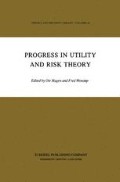Abstract
Proponents and critics of expected utility, cardinalists and ordinalists seem to agree on one point: Decisions under risk are not actually made through maximizing the expected value of a cardinal utility function in the classical sense (not defined through preferences under risk)1). Critics with few exceptions further think it is proved that nor is there any other function of wealth for which the expected value is maximised.2) Models have been suggested which in addition to expectation of (cardinal) utility take into account other aspects of the distribution (See survey in Machina 1983). The prospect model (Khanemann and Tversky 1979) takes into account what was, their utility function being a function of gain/loss.) Further they weight utilities by a function of probability. I commented on this in (Hagen, 1983). To adjust the impression, I quote from a letter to professor Tversky:
“Due to restrictions on space I may have failed to make explicit what I did not mean. However, I did not say that the use of decision weights is a weakness, even if I think other means of expressing a similar thought might be better. What I did consider as a weakness was that each weight was a funtion of the corresponding probability and nothing else (compare Allais’ model as quoted).
I admit that your reservation, that dominated games are not evaluated, excludes the predicition of choosing a dominated game. But the necesseity of this reservation reveals a weakness. To my example: Replace the certainty of $ 10.000 with the certainty of $ 9.999.99, with the utility 99.99995, against the utility of the game, 100. 96975. The certainty of $ 9.999.99 is then rejected in favour of the game which it is one cent from dominating.”
Access this chapter
Tax calculation will be finalised at checkout
Purchases are for personal use only
Preview
Unable to display preview. Download preview PDF.
References
Allais, Maurice “The Foundations of a Positive Theory of Choice Involving Risk and a criticism of the Postulates and Axioms ofthe America School (1979 in Allais and Hagen edrs. 1979
Allais, Maurice and Hagen, O. Expected Utility Hypotheses and the Allais Paradox, D. Reidel, 1979.
Hagen, Ole “Seperation of Cardinal Utility and the Specific Utility of Risk in Theory of Choices under Uncertatinty, Statsøkonomisk Tidsskrift No. 3, 1969.
Hagen, Ole A New Axiomatization of Utility under Risk “ Theorie A Metoda, IV/2, 1972.
Hagen, Ole Towards a Positive Theory of Decision under Risk” Allais/Hagen edrs. 1979 a.
Hagen, Ole Ambiguity in Normative Decision Theory” Forskning, Utbildning, praxis, ed. By Ingolf Stahl, Stockholm School of Economics, 1979.
Hagen, Ole Paradoxes and Their Solutions” Stigum/Wenstop (edrs.) 1983
Harsanyi, John C “Use of Subjective Probabilities in Game Theory”Stigum/Wenstop (edrs.) 1983.
Kahneman, D. and Tverslay, A. “Prospect Theory: An analysis of Decision under Risk Econometrica” 47 (1979) pp. 263–291.
Kryszotofowicz, Roman “Risk Attitude Hypotheses of Utility Theory”. Stigum/Wenstop (edrs.) 1983
Loomes, G. and Sugden, R. “Regret Theory: An Alternative Theory of Rational Choice under uncertainty” The Economic Journal (1982) pp. 805–824.
Machina, M.J. Generalized Expected Utility Analysis and the Nature of Observed Violations of the Independence Axiom. Stigum/Wenstøp (edrs.) 1983.
Pope, Robin, Robin “The Pre-Outcome Period and the Utility of Gambling”. Stigum/Wenstop (edrs.) 1983
Stigum, Bernt P. and Wenstop, Fred: Foundations of Utility and Risk Theory with Applications. D. Reidel 1983.
Stahl, Ingemar: Review of Allais/Haden (eds.) 1979 The Scandinavian Journal of Economics Vol. 82 Mo. 3, 1980 pt. 413 –417
Editor information
Editors and Affiliations
Rights and permissions
Copyright information
© 1984 D. Reidel Publishing Company
About this chapter
Cite this chapter
Hagen, O. (1984). Relativity in Decision Theory. In: Hagen, O., Wenstøp, F. (eds) Progress in Utility and Risk Theory. Theory and Decision Library, vol 42. Springer, Dordrecht. https://doi.org/10.1007/978-94-009-6351-1_8
Download citation
DOI: https://doi.org/10.1007/978-94-009-6351-1_8
Publisher Name: Springer, Dordrecht
Print ISBN: 978-94-009-6353-5
Online ISBN: 978-94-009-6351-1
eBook Packages: Springer Book Archive

